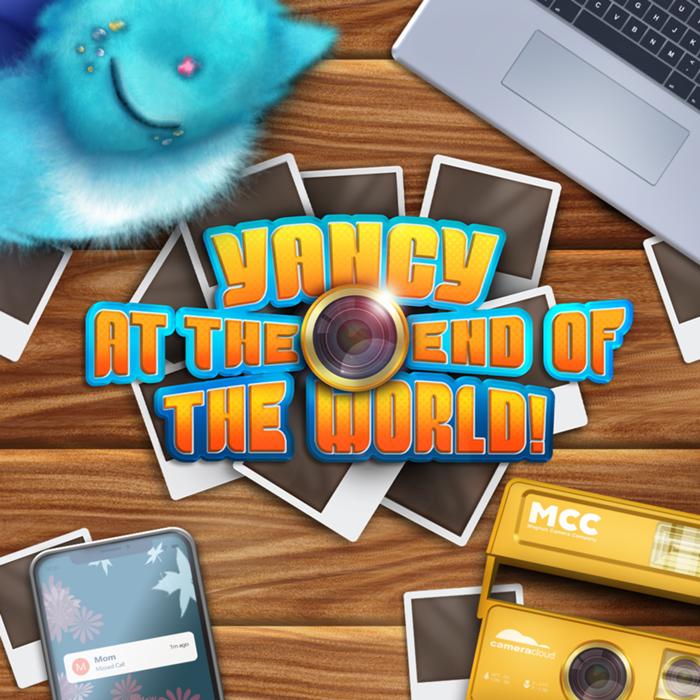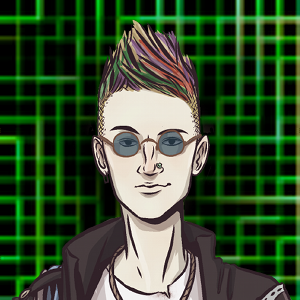
Review of:
Yancy At The End Of The World by Naomi Norbez
(IFDB)
If you’d like to see the other games reviewed this year, or understand my approach, head to the main page.
The end of the world is an alluring topic for a piece of fiction. Your classic zombie setting lets you play out fantasies like “physical might makes right” and it being okay with conducting a bit of ultra-violence on others, but only because they are mindless zombies and you were very po-faced at the start. You can transgress some social norms because the lines have been clearly shifted.
In fact, zombies are a typical metaphor for the anxieties of the time. They’ve been used to represent the worries of bioweapons, nuclear radiation, consumerism, slavery, the rise of authoritarianism.
Norbez uses the zombie apocalypse for unique ends, and to be honest, I don’t fully understand them. It comes through a variety of angles, all reasonable and simultaneously odd.
The emergence of zombies is treated as real, scary and potentially world-ending. But for the most part, most of the characters treat it like an inconvenience like a riot downtown messing up their plans to go to the movies. Later it is embraced as a life choice. Which is a weird phrase for undeath.
The protagonist Yancy has long yearned to do photography, despite chastisement from their mother (a fact we are told multiple times in the first scene). They use the zombie apocalypse as an excuse to take up the hobby as a last chance at being the human they want to be. Amidst the backdrop of death and disruption, do they take on the mantle like a war photographer, capturing truth in the chaos? Not really. They take photos of birds and trees and maybe bodybags. They commit to the idea of taking photos but not really the photos themselves.
By way of a really weird coincidence with the manufacturer of the part-photochemical, part-digital camera they buy, Yancy manages to reconnect with their best friend from high school, nekoniravioli. I have to admit I took multiple passes to unravel that name, and I guess it’s an analogue of Nikado Avocado, seeing as Nekoni has become a powerful influencer. And before I forget, I don’t really understand a camera that is both limited polaroid and has enough digital upload space with an AI assistant for thousands of photos. I get that the game loop gives you ten bites of the cherry, but amidst all its other grievances about corporate mindlessness, it’s a free kick for a brand new advanced technology camera to come with only enough space for ten digital shots without you buying their subscription model.
Where was I? Okay, the zombie apocalypse. Every character is adamant that despite the calamity, they are going to keep it grounded. And occasionally kvetch about the people going about their lives as if zombies weren’t roaming the earth. And I get it. COVID times were weird. New normals and “I hope this email finds you” and all that. You need to thread the needle between acknowledging the apocalypse and being swallowed by it. 100%. I felt like everyone in this game instead slalomed around the needle, looking for normalcy, acceptance and disaster equally.
And I mean the world is weird. Not just the world, but this world. Just casually one of your neighbours is an actual literal cat-fish named Horizon. I mean, someone called Horizon?!?! Their partner is a “colorful snow leopard” which is a confusing idea for me along the lines of “colorless green ideas sleep furiously”. But we just walk past these two and have a brief conversation how they fed my pet, and are somewhat my gay elder figures, and rail against my mother for disapproving of the idea of doing photography in high school. This pet, by the way, is a green fox-like cyclops because all feral animals are cyclopean, of course. And littered about the conversation are slightly odd lines like Hendrix (the snow leopard) expressing that if anything happened to their partner “they’d never live it down”. Like social shame and ignomy was the driving force behind not letting zombies eat your beloved.
Where was I? Oh yeah, high school. In high school, Yancy had not yet come out as agender and was best friends with the aforementioned nekoniravioli. As sadly expected, both had suffered bullying at school and denial of their reality from their parents. Yancy had disappeared off the face of the globe and uses the zombie apocalypse — I mean — newly-acquired photography hobby to reconnect. Nekoni happily reintegrates Yancy back into their life and introduces them to a creative group that meet up online. These creatives turn out to be some of the old bullies, popular kids and other hangers-on from high school days. So amidst the backdrop of people eating the faces of other people, day by day we relitigate some of the horrible stuff from high school. Everyone is a bit different now, especially with pronouns. Yancy is agender and aroace (does not seek or experience sexual or romantic attraction). Nekoni is trans. Another unnamed character is explained to be pansensual, not pansexual, mind. And there’s a lot of details floating around that I’m trying to keep straight, especially in this review. All the while, some of them might actually be furries? Or actual animals? Some characters use tone indicators, which I’d never seen before. It all matters for the characters but doesn’t matter for the story or what I think about it. It’s just more details to keep straight or feel a bit disrespectful by ignoring it. And I mean this purely in a mechanics-of-writing sense. It’s a richness of texture when the basic silhouette is a bit wonky. Everyone is wearing a stack of very finely, carefully and respectfully described hats, but what actually should matter is the interactions, and the interactions are okay, but not too surprising or enlightening.
Wait. Where was I? Oh yeah, the zombie apocalypse is a metaphor for human rights. Later it is revealed that zombies might be able to be turned back into normalish people. Far right groups rail against this, obviously. It kinda goes under the radar that the first thing we are explained about this particular zombie uprising is that it happens, a la The Walking Dead, after you die. You come back some time later and try to eat people, maybe. Although someone turns at a dinner party, and the protagonist themselves become a zombie maybe to spite their mother’s bigoted views without dying, so there’s some nuance. Oh and one of the creatives has their brother turn into a zombie and is put into cages by the government. Obviously putting people into cages is bad. Obviously leaving threats to human life just wander the streets is bad. Obviously the far right is bad, regardless. As a complete metaphor, I was kinda struggling. Zombies are a metaphor for LGBTIQ+? Like one day you die and are forced to come back as something else and even though that new form is scary and seemingly dangerous to your way of life, it turns out to be not so bad? Sure… but zombies? Vampires I can get behind, but maybe that’s too cool. The shifting dynamic of zombies being very not cool to being acceptable was slow but still odd to me.
One incredible feat Yancy takes on is to voice all of the verbal interactions with voice actors. I had a friend who tried to get voice actors for their game and that nearly killed him. It’s a lot of work orchestrating all the lines, making sure line reads are what the author had in mind, avoiding plosive-pops, and volume disparities, and table bumps, and background noise, and all that nonsense. It’s not flawless in Yancy —- sometimes the wrong line plays, or is missing, or isn’t quite the same as the text, or the line read is a little odd, or if you click too fast can overlap with the voice acting in the next page. But that stuff is really, really hard, and is at the level that can cripple a AAA games company. So Bez and the voice actors have done a phenomenal job. This is in addition to Bez organizing the visual art that pops up as your photos or the pieces others make. The art is mostly simple, but again, there’s a lot. There’s quite a lot of choices you can make throughout the game that get recalled, so it is clear on all axes Bez has put in a phenomenal amount of work.
Anywy, where was I? Oh yes, the game. Each day you have a loop of perhaps a news item then seeking out a photo opportunity, then there is a short stint DMing one of the creatives, then a phone call with nekoni, sleep and then repeat. Two-thirds of the loop is roughly dealing with high school trauma. The photography part… depends on what you choose, although returning to locations can give new scenes. The zombie apocalypse is never forgotten, but always seems to be slapping at the window outside of your therapy sessions about romance, sexuality, gender or how your Fox News-loving mother plays into all of that. There are ten photos in your camera, so you do ten loops. It’s… a lot. A lot of detail and a lot of trauma, and only a little of that involving juicy brains. I thought the online community of creatives Yancy joins was interesting, and could have been an interesting play on the “safe place” vs “safe zone” of zombie fortresses. But the zombie threat is mostly abstracted at the start, and then embraced in the end as a pseudo-allegory about gender/sexuality that I still don’t get even after describing it multiple times.
I guess where I’m going with this review is that Yancy At The End of the World has a lot going on. It’s tonally unique but never really capitalises on it. There is something much more tight or focussed inside of this game, but I don’t think that’s what the author wants. Exploring how communities dealt with supporting one another during COVID, the insanity of the ivermectin/bleach/COVID-denial crowd, the anxiety of Supreme Court decisions on people’s lived (or undead) experiences, normalizing safe spaces and a wide spectrum of personal approaches to friendships and gender and sexuality and identity… it all connects but doesn’t hang together for me.
And maybe that’s intended. Life is weird and hard and multidimensional and doesn’t have to make sense to everyone all the time. And if you want to make art, you should make art. It’s yet another hard thing to throw on top of everything else, but doing it and expressing it and ignoring ill interests and holding it out for others to review is, in the end, worth it.
